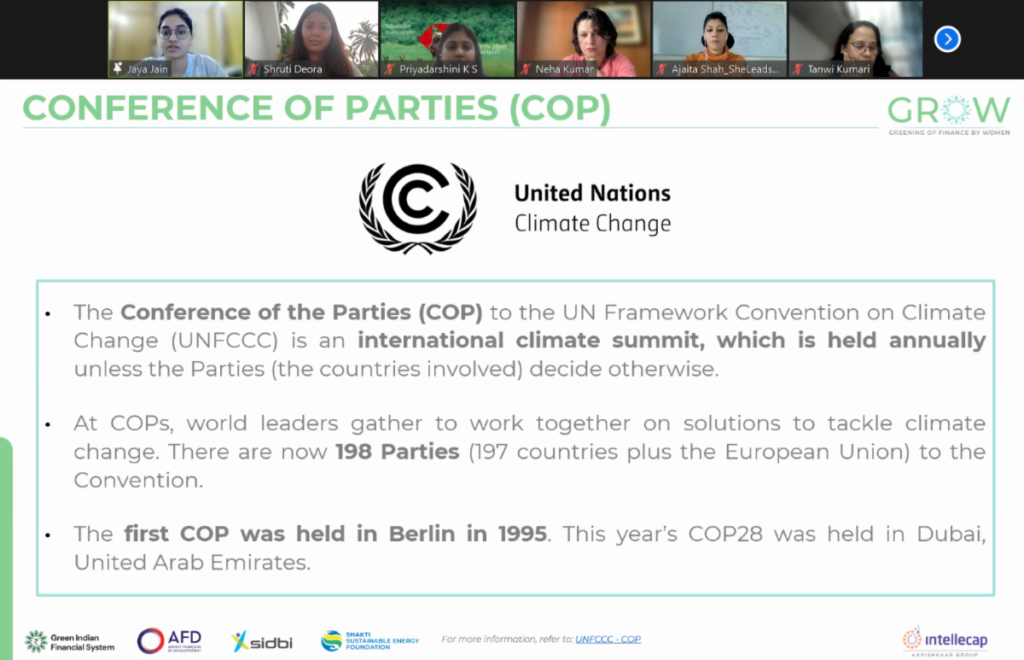Key Takeaways on the Climate-Gender-Finance Nexus from the COP28

On 18 December, the network for Greening of Finance for Women (GroW) held a virtual meet-up for its members to discuss key outcomes of the COP28 at the nexus of climate change, finance and gender. The session was facilitated by Ajaita Shah, Founder & CEO of Frontier Markets, and Neha Kumar, Head of South Asia Programme at the Climate Bonds Initiative. We had a diverse group of participants that were working as climate and sustainable finance professionals, gender experts, commercial bankers, program managers, entrepreneurs, and consultants.

Key Outcomes on Gender at COP28
- Global Stocktake: Acknowledged the importance of gender-responsive approaches as the way forward
- Climate Finance and Adaptation: Established loss and damage fund; all Parties to have country-driven, gender-responsive, participatory and fully transparent National Adaptation Plans by 2030
- Climate Tech: Endorsement of the updated gender policy and action plan for the Climate Technology Centre and Network aimed at enhancing gender considerations within the development and transfer of climate technology
- Launch of Gender-responsive Just Transitions and Climate Action Partnership
- Launch of Call to Action to produce and use gender-environment data
- USD 1.4 Bn in investments to the Women in the Sustainable Economy (WISE) Initiative
Key Outcomes on Gender at COP28
Ambition, accountability, and robust action play a key role in gender-focused climate finance. COP28 highlighted the need for blended capital and for all stakeholders to come together to build an ecosystem for women climate entrepreneurs and leaders. COP28 witnessed frank conversations on solutions, brought to the stage by developing countries. The solutions were remarkable as they are replicable and affordable; however, can become hyperlocal which warrants structural changes. Further, even though these solutions are pertinent, their representation and the proportion of climate finance flows remains low, and more so for women. While there are high-level declarations, a lot of implementation remains to be seen.
- We not only require outcome targets at the nexus of gender, climate, and finance, sectors like agriculture, health, etc. but also a transition plan to become green, sustainable, and productive.
- Currently, the lexicon of climate, transition plans are limited to cement, steel, etc. They need to be extended to buildings, agriculture, etc.
- The current emphasis of transition plans is on decarbonization as there are established and clear metrics for its measurement; however, a similar emphasis needs to be built on resilience. Climate resilience does not only imply resilience against climate hazards, but also socio-economic resilience, such as income, which is particularly important for women.
Gender-disaggregated Data:
- There are numerous data points available on gender, and sustainability but its tracking, measurement and institutionalization is critical.
- There is also a need for interoperability in what is being measured.
- Similar to decarbonization, specific metrics for climate resilience need to be established for data collection and impact measurement.
Climate Finance from DFIs:
- Women can become central players in addressing the problem of climate change with the integration of three key aspects: (i) Technology, (ii) Women Champions, and (iii) DFIs.
- European banks and DFIs are often financing the middle layer, which itself lacks a gender lens. An important conversation that occurred in COP28 was along the lines of how to improve coordination, collaborations, operational efficiency and financing of NBFCs and among DFIs.
- Women can become central players in addressing the problem of climate change with the integration of three key aspects: (i) Technology, (ii) Women Champions, and (iii) DFIs.
- European banks and DFIs are often financing the middle layer, which itself lacks a gender lens. An important conversation that occurred in COP28 was along the lines of how to improve coordination, collaborations, operational efficiency and financing of NBFCs and among DFIs.
The COP28 agreement signaled the ‘beginning of the end’ of the fossil fuel era; however, the transition needs to be just and equitable transition. Even though a lot was discussed and announced on the climate-finance-gender nexus, a lot more needs to be done and implementation of the discussions would be key for any tangible impact. As GroW, we hope to incorporate discussions / movements on these to achieve a gender equitable green and climate finance sector. Join GroW if you are interested / aligned and would like to make this a reality.





